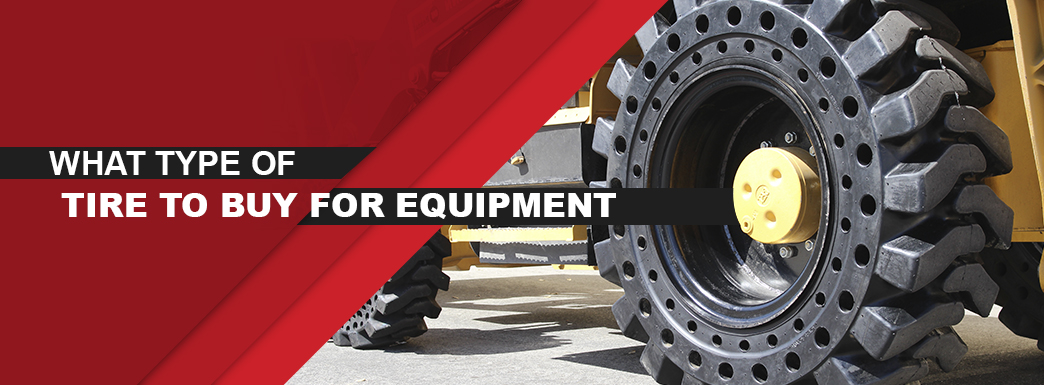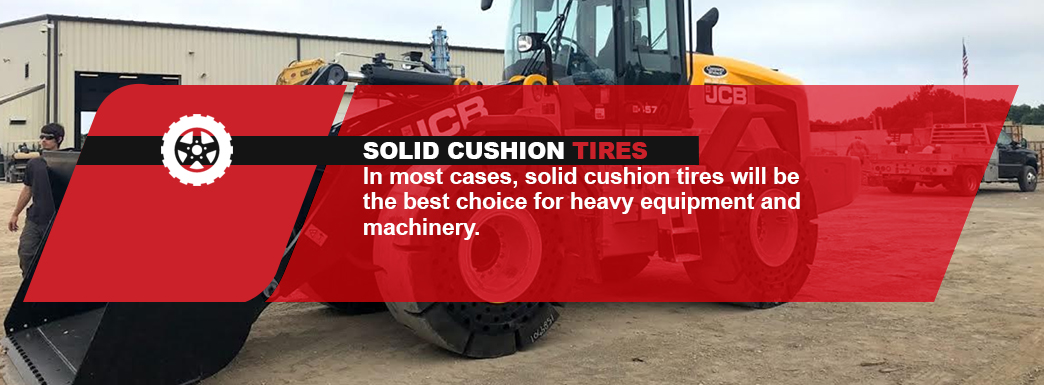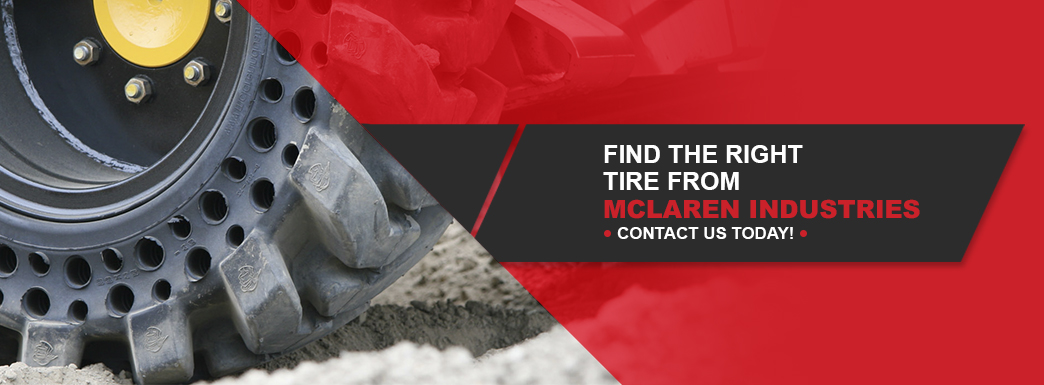
What Type of Tire to Buy for Equipment

When you own and manage a fleet of heavy machinery, cutting back on costs is a crucial goal. One way to do so is by minimizing the amount of money you have to put into your fleet for repairs and replacement machinery. The efficiency and reliability of your machines depend upon their condition and parts, including the type of tires you use.
The tires on your machinery must be high quality to complete the job quickly and accurately, as well as to keep your employees and other on-site contractors safe. By choosing the right tires for your equipment, you can make more money while also improving the overall safety of your staff.
Types of Tires to Consider
Machinery owners can choose from many types of tires, each with its pros and cons. Depending on the machinery you have and the types of projects you take on, you should look for certain key features and abilities. In general, owners can choose between three major types of tires for their fleets.
1. Solid Cushion Tires
In most cases, solid cushion tires will be the best choice for heavy equipment and machinery. The heavy-duty, solid rubber tires from McLaren Industries will improve ride quality, productivity, operator comfort and ultimately, your bottom line. We design our solid cushion tires using proprietary technology that allows us to offer tires that are more responsive and stronger than their pneumatic counterparts.
Our solid tires incorporate semi-pneumatic technology to create a durable, shock-absorbing tire model. This technology involves three layers that make our solid cushion tires the best option for most heavy equipment and machinery:
- Base compound: This rigid layer also includes a bead wire that runs throughout the tire to provide additional durability.
- Cushion compound: This proprietary material has excellent shock-absorbing abilities via relief holes.
- Outer layer: The outer layer of our solid cushion tires serves the purpose of protecting the first two layers from sharp objects that could otherwise puncture the tire.
Due to the meticulous attention to detail we put into our tire manufacturing process, we provide our customers with tires that last four to five times longer than standard versions of these products. Our solid cushion tires combine the durability and shock-absorbing characteristics of other tire types to serve as an all-around best choice no matter your machinery, job site terrain and other factors. With its greater lifting abilities and improved traction, your team will experience zero downtime because of a flat tire.
In addition to the most effective construction, our solid rubber tires come in several sizes, styles and tread patterns. Whether you're going to be using this equipment daily or only on occasion, we have a solid cushion tire that will fit your needs. Our representatives will be happy to assist you with any questions you might have.
The Nu-Air series is our core product line with tires that can function optimally in any of the following terrain conditions:
- Dirt terrain: Ideal for dirt, mud, sand and rocks
- All terrain: Capable for rough terrain but better on hard, flat surfaces
- Rocky terrain: Best for demanding environments that require intense durability
- Smooth surface: Usable on asphalt and flat concrete
- X-dirt terrain: An enhanced, higher-durability design of the dirt terrain tire
- Air monster: Designed for terrains with a lower ground pressure
In addition to the Nu-Air series, we offer a value-priced Maximizer™ line that is ideal for occasional use and other less-demanding applications.
Be sure to consider the solid tire pros and cons before making your final decision. Why buy solid cushion tires? The pros of solid cushion tires include:
- Extremely durable, shock-absorbent and puncture-resistant
- Applicable to a range of equipment types, terrains, project scopes and brands
- Less expensive than other options due to a simpler manufacturing process
- Long-lasting and simple to maintain
- Capable of functioning in both large and small areas
Meanwhile, some cons of solid cushion tires are:
- May leave behind more soil disruption than softer tires
- Depending on the tire manufacturer you choose, slightly less comfortable ride for operators than softer and lighter tires
So, why buy solid tires from McLaren Industries? Because they're dependable, well-designed and applicable for a range of projects and equipment. Our solid cushion tires are suitable for skid steers, backhoes, telehandlers and more and are compatible with all major brands, including Bobcat, John Deere, Cat, Volvo and more. We have one of the largest and most inclusive selections available to fleet managers.
2. Foam-Filled Tires
When you compare solid and foam-filled tires, you might wonder why tires get foam filled in the first place. Essentially, foam-filled tires prevent flat tires because if they are ever punctured, there is still foam inside to keep the tire functional. This is one of the primary differences between foam-filled vs. air-filled tires. Solid cushion tires follow the same methodology as foam-filled tires, only they are more durable than the foam-filled alternative. The added weight of the foam-filled tires may also improve traction slightly. While solid cushion tires are the best choice all-around, if you're on a budget and need a stepping stone between air-filled and solid cushion tires, foam-filled tires may be a suitable choice.
Like any other tire option, foam-filled tires have their pros and cons. Some of the pros of foam-filled tires include:
- Cannot go flat
- Potential for added traction due to extra weight
Meanwhile, the cons of opting for foam-filled tires are:
- Potential for added weight to be too heavy for skid steer drivetrain
- Somewhat difficult to replace the tires — you must cut both the foam and the tires themselves from the rim
- More uncomfortable riding quality for the operator
- Shorter lifespan due to reduced durability compared to solid cushion tires
- Frequent replacement due to regulations that require you to replace the tire anytime the foam is coming out of the tire — even if it's brand new
So, why buy foam-filled tires? Foam-filled tires are essentially a mid-way point between air-filled and solid tires. If you know you need to move your fleet away from air-filled tires but aren't ready to make the jump to solid cushion tires, foam-filled tires can help you achieve some of the same benefits as the superior solid tires.
3. Pneumatic Tires
Pneumatic tires, also known as air-filled tires, are the most traditional option. These tires are standard on cars, trucks and other common vehicles. They can also sometimes be used for heavy equipment, depending on conditions. When you consider pneumatic vs. solid tires, pneumatic tires are much less puncture-proof and gripping than solid cushion tires. However, they do still offer high performance in some areas, such as indoor/outdoor warehouses.
In general, you have two choices when you shop for pneumatic tires:
- Bias construction: Bias construction is the most popular option because it is less expensive and also has a strong protective wall that helps to prevent sharp objects and construction debris from causing a flat. Bias construction pneumatic tires also skid as the machine turns, which makes it an attractive option for smooth operation.
- Radial construction: Radial construction tires include several steel belts layered throughout the tire's tread in an attempt to protect the tire from sharp objects. In theory, the belts allow the tires to be puncture-resistant and also maintain proper suspension.
Whether you choose bias or radial construction, there are several pneumatic tires pros and cons you should be aware of before purchasing air-filled tires for your fleet.
The pros of pneumatic or air-filled tires are:
- An easier ride for the operator due to the tire's flexibility
- Increased traction in some terrains due to its ability to conform to different textures
- A less bumpy ride, which makes it safer for the load you are carrying
While these pros may make pneumatic tires seem like an acceptable option, air-filled tires can have more cons in terms of heavy industrial use:
- The potential for a flat tire, which can be incredibly costly for your company in terms of both time and money
- The wheels will have a larger footprint and increased deflection, which means it will take more gas and energy to get the machinery moving
- Wheels will be more difficult to turn and will require a larger turn radius
- Added maintenance responsibilities, such as monitoring air pressure and replacing tires more frequently
While pneumatic tires may be an acceptable short-term solution for your heavy equipment tires, they will end up being more costly for your company to maintain and replace, as well as less efficient on your job site.
Which Tire Is Right for Me?
Now that you know the three main choices you have for your heavy equipment tires, you'll want to consider your unique situation and applications to decide which is the right tire for you. Here are some of the major considerations that will help you make your decision:
- How often will you be using the equipment that these tires are for?
- What applications will you be using this equipment for?
- How heavy will the loads you're carrying be?
- What type of turn radius do you need?
- How important are operator comfort and handling?
- Are you willing to risk the somewhat likely potential of having a flat tire at some point?
- How often are you willing to perform maintenance tasks on your tires?
- What types of terrains will you need these tires to function on most frequently?
- Do you have any space constraints?
- Will you be using this equipment inside, outside or both?
Be sure to also research your specific machinery as you determine the type of tire you should purchase. Some equipment will require one kind over the other options for the machinery to operate smoothly and efficiently.
Since most fleet managers would prefer not to risk the potential of having a flat tire and dedicate working hours to tire maintenance, pneumatic tires are rarely the best choice for heavy equipment tires. When you're considering which tires to buy for skid steer operation, the benefits of air-filled tires do not outweigh the significant amount of time and money that this type of tire would take away from the company.
So, that brings us to the question of which is best — foam-filled or solid tires? For most construction and heavy machinery applications, we at McLaren Industries will always recommend solid cushion tires over foam-filled tires. Here's why:
- Stability: Solid cushion tires have the best puncture resistance of all the tire options, and you won't experience a flat tire. The same sharp objects, rocks and debris that would puncture an air-filled or even foam-filled tire can't take out a solid tire. Solid tires are by far the most durable option for heavy machinery and equipment in the rockiest and harshest terrains.
- Longevity: Since solid cushion tires are so durable, they will also last for much longer than pneumatic or foam-filled tires. You won't have to replace your tires every few years like you do with pneumatic and foam-filled tires, meaning you'll end up saving both time and money.
- Efficiency: When you don't have a flat tire on some piece of equipment every few months, your company can be much more efficient by avoiding that costly downtime. Having a flat tire can push back projects by days or even weeks, depending on the type of tire and its availability in your area. When you have solid cushion tires, you won't risk losing precious time and money right in the middle of a project.
Like everything, solid cushion tires do have one drawback — they're less flexible, meaning they can be more destructive to the terrain and also result in a bumpier ride for the rider and the load. That's why at McLaren, we've combined the best features of air-filled and solid filled tires with what we call "semi-pneumatics." This technology is what resulted in our incredibly effective solid cushion tires, which provide a more comfortable ride than completely solid tires due to a layer of air inside the tire. Since the tire isn't totally filled with air and is mostly solid aside from this single layer, it offers the durability of solid tires with the comfort and flexibility of pneumatic tires.
Find the Right Tire From McLaren Industries
Whether you've narrowed down your options to a few types of tires, already know exactly what kind you want or need a little assistance and guidance in the selection process, the team at McLaren Industries is ready to help. We've been producing rubber tires and tracks for 25 years that are ideal for several types of equipment. In addition to selling these products, we also manufacture them ourselves. This allows us to fully serve our clients and answer any questions they could have about our offerings. Our products are designed to fit major brands like John Deere, CAT, Kubota and more.
Ready to reach out about the next tires you need for your fleet? Contact McLaren Industries online today, or give us a call at 800-836-0040.

 By McLaren Industries
By McLaren Industries 